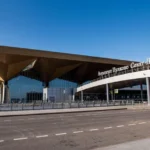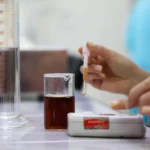The Prosecutor General’s Office has filed a lawsuit with the Sovetsky District Court of Makhachkala, demanding that an association created by members of the family of former State Duma deputy Magomed Gadzhiev* (recognized as a foreign agent) be declared extremist and its activities banned, and that their property, valued at nearly 2 billion rubles, be transferred to state ownership.
According to two sources familiar with the lawsuit materials, the investigation was conducted on the orders of Prosecutor General Igor Krasnov and established that the association includes the ex-deputy’s partner, his son, and his sister.
The sources claim that the plaintiff, explaining its demand, notes that this association is based on “political and ideological tenets expressing support for foreign states hostile to the Russian Federation, including Ukraine, and their armed formations.”
According to law enforcement, an unlawful group is operating abroad, including through funding sources within some constituent territories of the Russian Federation. Its activities pose a threat to the life and health of Russian citizens, as well as to the security of society and the state.
According to the lawsuit, after the start of the special military operation in Ukraine, the former deputy went abroad, where he continued to provide financial support to Ukrainian armed formations and engaged in discrediting the Russian Armed Forces.
According to the sources citing the lawsuit, while outside the country, Gadzhiev expressed a willingness to cooperate with Western intelligence services in exchange for obtaining foreign citizenship. He made a corresponding statement in a video that was posted online and made available to an unlimited number of people.
The plaintiff indicates that Gadzhiev’s assets in Russia are allegedly under the control of his son and sister, who manage them and thereby provide financial support for extremist activities. The prosecution also considers his father, son-in-law, and the parents of his partner to be holders of the ex-deputy’s hidden assets.
Commercial real estate, elite housing, and land plots with a total value of over two billion rubles in Moscow, the Moscow region, and Dagestan are registered in the names of relatives and close associates. These include buildings in Lavrushinsky Lane in the center of the capital and plots in the suburban area of Rozhdestveno.
As part of the fight against extremism, the Prosecutor General’s Office demands that this property be transferred to state ownership and that it be seized pending a court decision. Furthermore, the court is being asked to revoke the license of the company “Sulaknerud,” controlled by Gadzhiev, for the extraction of sand and gravel mixture at the Chiryurtovskoye deposit in Dagestan. According to the prosecution, the company’s profits are being siphoned abroad through illegal schemes—to the USA and France, where elite real estate is registered in Gadzhiev’s name.
Gadzhiev was a State Duma deputy from “United Russia” from 2004 to 2019. Previously, he held the position of deputy head of the department of the Ministry of Taxes and Levies for Dagestan, and later for the Southern Federal District.
In May 2023, the Ministry of Justice added Gadzhiev to the register of foreign agents. The ministry stated that, while abroad, he expressed a readiness to cooperate with foreign sources in order to obtain a foreign passport and declared his support for the Ukrainian authorities.
A few days later, “United Russia” announced Gadzhiev’s expulsion for actions discrediting the party. The Head of Dagestan, Sergey Melikov, in his Telegram channel, called this decision logical. According to him, for the sake of a European passport, Gadzhiev “proved willing to slander everything that is close and dear to us: his fellow countrymen, friends, the republic, the country, and even religion.”
*Added to the register of foreign agents of the Ministry of Justice of the Russian Federation.






